- Home
- Derek Ciccone
Officer Jones Page 2
Officer Jones Read online
Page 2
“She’ll have two orders of sushi-the hosomaki-and two glasses of your best Cabernet. I’ll take a cheeseburger and a bottle of your cheapest beer.”
Bridget fought back a grin, gathered herself, and asked me which type of cheese I desired on my burger. I made a not very funny joke about holding the cheese on the cheeseburger, which received a giggle. I settled on American cheese. I’d been to so many countries the last twenty years that American seemed exotic.
Lauren flashed me a dirty look for going against her wishes. Or perhaps for evoking the flirtatious giggle from the waitress. The why really didn’t matter at this point. She then sent an obvious fake smile in Bridget’s direction. She’d mastered both looks. Who says there aren’t usable life skills gained from beauty pageants? Certainly not the former Miss Beaufort County South Carolina who sat across from me.
I ignored Lauren, seeking the refuge of a daydream. But I was jolted back to reality by an angry twang firing at me from pointblank range. “Are you listening to me, John Peter?”
I’ve always been confused as to why she calls me John Peter, since that’s not what JP stands for. “I’m sorry, you were talking about um … well … you know the…”
She flashed me her most displeased look. “I was talking about our trip to visit my parents in Hilton Head this weekend. It’s the Fourth of July, if you haven’t forgotten.”
I racked my brain to think if it were actually possible that I’d agreed to this. I had interviewed rogue dictators and heartless terror-mongers over the years, but I still wasn’t sure I was prepared to meet the people who created Lauren Bowden.
“I did?”
She sighed theatrically. “Yes, first we will stop in North Carolina for my big interview with Lamar Thompson, and then to Mommy and Daddy’s place. They insisted we stay with them.”
It was best not to argue. She would just claim that my forgetfulness was due to jealousy, since she was able to beat me out for the Thompson interview. The truth was, I would have refused it, due to its tabloid nature. In the world according to Lauren, this would be another example of why I’d become a dinosaur in this business, and my career was “in a dreadful decline.” Little did she know that this dinosaur was about to become happily extinct.
The interviewee in question, Lamar Thompson, first entered the limelight twenty years ago when he was a high school basketball star out of Columbia, South Carolina. At the time, he was the most celebrated and highly recruited prep basketball player in history. Lamar chose the University of North Carolina, but he never got to play a game.
On an October night of his freshman year at UNC, two weeks prior to the start of basketball season, it all ended for him. In the spirit of being young and stupid, Thompson and a couple of fellow classmates decided to spend their Friday night pulling a prank. They hid in the wooded area alongside a dark, country road in a small town outside of Chapel Hill. When an unsuspecting car drove by, they tossed a lifelike dummy onto its hood, giving the driver the impression of having struck a real person. It was followed by beer-buzzed laughs of insensitive youth and an exhilarating dash for safety.
It eventually led to a high-speed chase with police, which ended with Thompson’s car slamming into an oncoming vehicle driven by Marilyn Lacey. The mother of three was killed instantly.
There were two other people in Thompson’s car-fellow UNC classmate Brad Lynch, who died from injuries sustained in the crash, and another passenger who survived, but was never identified due to the fact he or she was a juvenile. But when word got out, it really didn’t matter who else was involved, because the only name people were talking about was Lamar Thompson … the next great thing.
Lamar’s leg was mangled in the accident, ending his promising basketball career. That was the good news for him. The bigger problem was that he was legally drunk, and despite his claims to the contrary, he was identified as the driver. He served five years in the state pen for vehicular manslaughter. The years following were no kinder to him-he was now an unemployed night watchman with a history of substance abuse.
But the reason Lamar Thompson was once again relevant, was his recent assertion that there was a fourth man in the car that night named Craig Kingsbury, and that he was the one who was drunk behind the wheel. The reason this was front-page news, and screwing up my holiday weekend, was that Craig was now Senator Kingsbury, who had just tossed his name into the ring to become the next President of the United States, and many believe the frontrunner.
Lauren grew annoyed with my distracted pause. “John Peter, where are you today?”
The question was not where I was, but rather, how the hell did I get here? My old high school journalism teacher, Murray Brown, always preached that journalism went beyond the traditional who, what, where, why, and how. A great journalist tells a story, and to write the ending, one must return to the beginning. And whenever I return to the beginning of my story it always takes me back to Gwen.
Chapter 4
I first met Gwen Delaney when her family moved two houses down the street from ours in the town of Rockfield, Connecticut. We were five years old. From that point on we were inseparable. We went from childhood friends to teenage romance, and then off to Columbia University with plans of one day owning a small-town newspaper and having lots of babies. That was before Saddam Hussein changed everything.
During my freshman year at Columbia, I took an internship at a start-up cable news network called GNZ. The idea of twenty-four hour news was gimmicky at the time, compared to the traditional print journalism that I aspired to. But being the uber-achiever that I was, I thought television experience would be a good resume builder. Little did I know that it would be a career launcher.
Since GNZ was in its infancy, it didn’t have the budget of its competitors like CNN. So when war broke out, they offered their one and only intern, JP Warner, the opportunity of assisting their lead international correspondent, Jonathan Horvitz, during the war coverage. This was a dream opportunity for a kid who grew up idolizing war correspondents like Ed Bradley and David Halberstam, and I was all in-I could make up the school work, this was the opportunity of a lifetime, even if my horrified parents didn’t see it that way.
As history would have it, Horvitz didn’t have the stomach for battle, and ended up hiding under the bed of our Baghdad hotel room, praying to whatever deity would listen. So, three years removed from being able to legally buy a drink, I spent six weeks providing on-camera reports from the front-line.
The Gulf War wasn’t much of a fight, as far as military conflicts go, but what it will always be remembered for was that it was the first “TV War.” It changed the war correspondent from a brave, noble observer into a television star. Lines were blurred, and some would say it was the beginning of reality TV. Although, nobody is quick to take credit for reality TV.
When I returned home, I learned that I’d become as much of a story as the war itself. I can still recite my first glorious review in the New York Globe:
Nobody came out of Desert Storm a bigger star than the youthful JP Warner. With rugged good looks, he appears more like a leading man the likes of Newman or Redford, than the typical news reporter in the image of Cronkite or Rather. He comes across as courageous, confident, honest, and outspoken. Some will question his credentials or experience, but nobody can deny he is a star in the making.
I was hooked. During my remaining years at Columbia I worked every free moment I had at GNZ, and then signed on to become an international correspondent the day after I graduated. I wanted Gwen to come with me, but she refused, remaining in New York to report for the New York Globe, and spending most of her time writing obituaries. Little did I know that I was writing an obituary for our relationship, as we drifted further and further apart. At one point I actually began to believe our relationship was holding me back. Although, in hindsight, I’m a little fuzzy as to what exactly I was being held back from. Not even when Gwen decided that we need “some time apart,” which soon changed to “a lot of time apart,” did
I ever think that we wouldn’t be together one day.
That was, until I received the invitation to Gwen Delaney and Stephen DuBois’ wedding. It was the moment JP died and J-News took over completely.
I threw every tortured emotion I had into covering the most dangerous stories in the most treacherous areas of the globe. I was willingly turned into a packaged image of the news warrior, who not only ran toward the danger, but looked good doing it. I wore three days growth on my face to feed the image. Same with my wardrobe, which led to my nickname of J-News, because it was said I looked like I just stepped out of the J-Crew catalog into the war zone.
But I wasn’t all style over substance-I took on the toughest stories in places most journalists wouldn’t even think to venture. Some, my mother included, claimed I had a death wish. Maybe I did. My youthful idealism was replaced by a hard-edged and arrogant swagger that I’d convinced myself was necessary to survive in such a dangerous business. I wasn’t very well liked, but I was respected … at least I thought so.
Then last spring, I walked back onto the campus of Columbia like the conquering hero I believed I was, to be a guest lecturer in my old journalism class. When I finished my ode to myself, a pretty girl with long, raven hair and radiant green eyes rose to ask a question. I was startled by the resemblance; for a moment I actually thought it was her. Then very much like Gwen, she zinged me with a question, asking me if I’d missed being a journalist since my industry had become nothing but loud, ratings driven sensationalism.
It was at that exact moment that my midlife crisis began. And I was forced to face the truth-it wasn’t my journalistic roots driving me. And worst of all, somewhere along the way I had become just like Lauren-a self-involved self-promoter who was addicted to publicity.
The reality was that I kept feeding the J-News monster because it was the only thing that could remove Gwen from my daydreams.
Chapter 5
Shouts of “John Peter! John Peter!” shocked me back to the present. Unless I was the next contestant on the Price is Right, I had no idea why Lauren was shouting at me with such vigor.
“You promised that our lunch wouldn’t be interrupted,” she chastised.
I found this a little odd coming from someone who’d made three phone calls, sent four texts, and posted a picture of herself on Twitter since we’d arrived. “What are you talking about?”
“Your big slug friend is here.”
“What?”
Before Lauren could answer, I felt the gargantuan arms wrapping around my neck, clamping me in a headlock. It could only be one man.
When he released me from his clutches, and my breathing returned to normal, I looked up to see the smiling man who was once a professional wrestler known as Coldblooded Carter. For longer than I can remember, Jeff Carter has been my scout, confidante, bodyguard, and the man with numerous contacts throughout the world that helped uncover the stories that ratings bonanzas are made of.
“Hope I didn’t interrupt you two lovebirds,” Carter’s booming voice filled the patio.
Lauren looked at him like he was the Ebola Virus. “John Peter and I were discussing our plans for the Fourth of July, and yes, you are interrupting.”
Carter laughed, infuriating her more, before turning his attention back to yours truly. “So what are these big Fourth of July plans, JP?”
Lauren answered for me, “Following my big interview with Lamar Thompson, we are going to spend the holiday with my family in Hilton Head.”
Carter faked a look of interest. “Wow! Meeting the parents-this is a big step, JP.”
“And Hilton Head society,” I added, now also smiling.
Carter flashed his famous sly grin and I could tell he was about to jump off the top rope and drop a flying elbow on her plans.
“Oh, by the way, I forgot to mention that JP won’t be able to attend your family gathering. We have business to attend to.” He tilted his head toward the ground as if he was mourning the dead.
My ears perked up, suddenly interested in the conversation.
Lauren boiled over. This had happened before. “John Peter,” she addressed me like a mother scolding a child.
I shrugged, as if unable to stop the inevitable.
“You have a choice, John Peter-me, or that big slug. If you walk away from this table we’re over.”
Carter picked me up like a rag doll and slung me over his shoulder. “He’s not walking away … I’m carrying him.”
A rumble of laughter erupted from the other patrons. From my perch, I caught a glance of Bridget, who was unable to fight off a smile.
Carter carried me out of the patio area to a chorus of, “John Peter, get back here!”
Finally on the bustling sidewalk, he set me down.
“Thanks, I think you saved my life,” I said, meaning every word.
Carter laughed. “I have three ex-wives-I can sense when a man needs to get six time-zones away.”
Chapter 6
We began walking away from Norvell’s, looking like the oddest of contrasts.
Even though I stood six-foot tall, Carter still towered over me by half a foot. His head was shaved to the scalp-the only hair from his neck up was a goatee that reached at least two full inches below his chin. He wore his trademark wraparound sunglasses and sleeveless denim jacket.
I, on the other hand, looked like I was preparing for a career on the PGA Tour, wearing a lavender golf shirt and a pair of khakis.
Carter was not one for small talk and got right down to the reason he abruptly ended my lunch, and perhaps my relationship.
He opened his camouflage colored backpack and pulled out a black and white photo of a bearded man wearing the latest in Middle Eastern headgear. “Do you know who this is?”
I halfheartedly examined it. When it didn’t ring a bell, I shrugged. “No idea.”
“This, my friend, is Az Zahir.”
Still nothing.
We reached our subway entrance and descended the crowded, muggy stairwell.
Carter found an unpopulated spot on the swamped subway platform. When the coast was clear, he told me the story of a young man from Chicago named Az Zahir, who was once an engineering student at Northwestern University. He was whisked away from his home in the middle of the night, accused of being a ranking member of Al Muttahedah, and was plotting to do some demolition work on a few of America’s favorite buildings and monuments.
Al Muttahedah was a merger of the leading Islamic terrorist groups, who were pooling their resources to try to make a dramatic comeback in the War on Terror. They’d been operating under the radar until I exposed them last year in an investigative report for GNZ. They weren’t happy about the sudden spotlight that had been cast on them, and supposedly put a bounty on my head. Carter comforted me, explaining that groups like them are only interested in killing innocent people, and I was anything but innocent.
Our train screeched to a halt with the whistle of air brakes. But prior to boarding, I was approached by a family. They asked if I would take a photo with them, and I happily obliged. Carter didn’t share the sentiment. He grabbed me by the collar and pulled me onto the train. Brute force was always his answer to solving a problem, and while it’s not always politically correct to say, it’s usually an effective method.
We found a spot and grabbed the overhead bars to steady ourselves. Carter’s glare repelled anyone who thought of getting within ten feet of us. He showed me the picture again, and this time it clicked.
“I remember now. He was involved in that plot to blow up Soldier Field during the NFC championship game. His parents were on the news every night crying about his civil rights like he was some modern day Rosa Parks. I think they claimed he ordered the tote bag, but they accidentally sent him the suitcase nuke.”
“He was such a good Samaritan he won an all-expense paid water-boarding vacation to lovely Guantanamo Bay. But his stay was short, as he cut a deal with the CIA, which released him so that he could re-join his buddies a
t Al Muttahedah. The CIA wanted to use him as bait to help them assassinate their leader, Mustafa Hakim. I know you’ll find this hard to believe, but Az Zahir double-crossed the CIA, and the assassination attempt was foiled. Al Muttahedah was now reportedly hiding out Zahir. His last sighting was in Uzbekistan, almost six months ago. But of course, the US government denies any of this took place.”
“Let me guess-they granted us an interview to give them a platform to spew their hatred? We barter propaganda for ratings. Just please tell me we’re not going to Uzbekistan. I hate Uzbekistan.”
Carter gulped a frustrated sigh, and slowly blew it out. He looked like he wanted to put me in the most painful wrestling hold he could think of. But instead, he pulled out a pen and paper from his backpack and wrote down our destination for me. After I read it, he ate the piece of paper.
Chapter 7
As our train hit the 84th Street stop, Carter growled at me, “Okay, I told you my part, now it’s your turn.”
“My turn?”
“I gave you the details of the mission, now I wanna know what’s going on with you.”
“I have no idea what you’re talking about.”
“The JP Warner I know would not be taking some happy horseshit pictures with some Beaver Cleaver family. He would be so fired up to get some payback on the bastards who put a bounty on his head, that he would have knocked the family into the tracks if they got in his way-not this lethargy thing you’ve been giving me.”
“Lethargy? Don’t pull a muscle on the big words, Carter.”
He shook his head. “You can try acting like your normal cocky-jerk self, but you’re not fooling anyone. I’ve seen the signs for months. Your mind is somewhere else, and this smiling and being nice to people thing is starting to creep me out.”
“Where did you get your psychology degree … Pro Wrestling University?”

 The Carolyn Chronicles, Volume 1
The Carolyn Chronicles, Volume 1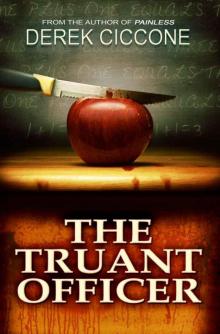 The Truant Officer v5
The Truant Officer v5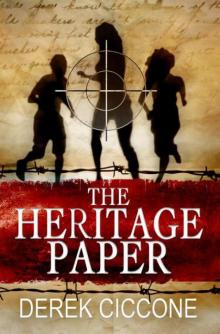 The Heritage Paper
The Heritage Paper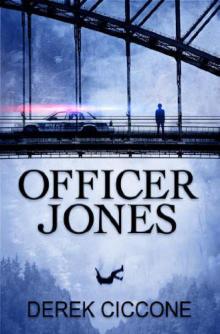 (2012) Officer Jones
(2012) Officer Jones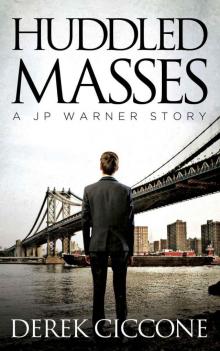 Huddled Masses (JP Warner Book 2)
Huddled Masses (JP Warner Book 2)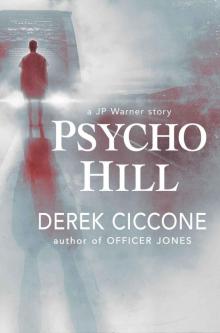 Psycho Hill (JP Warner Book 3)
Psycho Hill (JP Warner Book 3)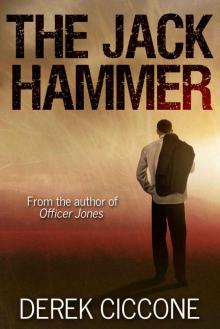 The Jack Hammer
The Jack Hammer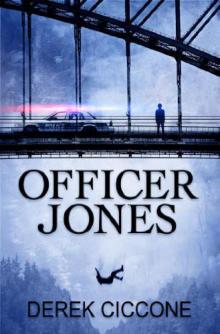 Officer Jones
Officer Jones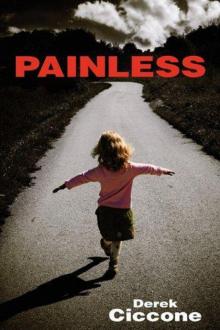 Painless
Painless